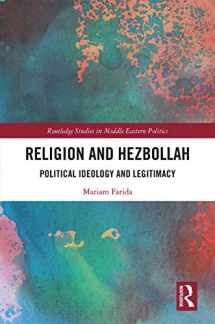
Religion and Hezbollah: Political Ideology and Legitimacy (Routledge Studies in Middle Eastern Politics)
Book details
Summary
Description
This comprehensive and thought-provoking volume examines the role and function of religion in Hezbollah’s political strategy in the context of contemporary Lebanese politics and global security.
The book demonstrates how Hezbollah uses religious mechanisms such as taklif shari (religious assessment), ijtihad (interpretation) of jihad, and fatwa (religious verdict) as political tools to mobilise the Shi’a in Lebanon and the Middle East and to build political support. The comprehensive content analysis scrutinised speeches of Hezbollah Secretary General, Hassan Nasrallah, from 2000 to 2013. The results provide and inform a wide-scoping discussion of Nasrallah’s uses of rhetorical devices and context to imbue religious elements into Hezbollah politics to mobilise and motivate supporters. Additionally, a case study analysis of Hezbollah’s intervention in the Syrian conflict is also included. This further demonstrates Hezbollah’s strategic use of political pragmatism and religious rhetoric to link its political and military agendas and to transition the Party from a resistance group in Lebanon to a regional actor with a regional priority.
As such, readers are provided with new and interesting insights into Hezbollah’s ideology and identity as a domestic and regional non-state actor, and the social mobilisation of Shi'a in Lebanon and the region. Providing a nexus between religion, politics, and security, the book will be a key resource for students and researchers interested in religious studies and Middle East politics.


We would LOVE it if you could help us and other readers by reviewing the book
Book review



